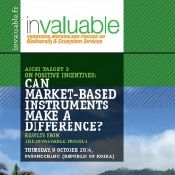Filling In The Information Gap On Market Based Instruments For Biodiversity Conservation
Market based tools like economic incentives and offsets may be a key way to finance biodiversity conservation but the little clarity and certainty surrounding their success rates causes policymakers to overlook them. The INVALUABLE project says it can change that by providing the necessary data. Project researchers presented their latest findings at a COP 12 side event.

11 November 2014 | Biodiversity conservation lacks funding. Market-based instruments (MBIs) like payments for ecosystem services may be able to help. They can offer positive incentives for practicing sustainable activities that protect forests and watersheds and, in turn, conserve animals and their habitat.
MBIs have grown substantially in terms of use and visibility in the environmental space, according to the Institute for Sustainable Development and International Relations (IDDRI), which is a non-profit based on policy research. But they lack concrete data on several components. Success rate is one such component lacking data. And because of this information gap, MBIs aren’t understood properly and aren’t used as often as they could.
In order for these instruments to significantly contribute to biodiversity conservation, this information gap must be addressed. IDDRI along with several partners intends to do that with the INVALUABLE (valuations, markets and policies for biodiversity and ecosystem services) project. The initiative’s overall objective is to clarify the potential of MBIs for financing conservation to policymakers so biodiversity can be better integrated into economic systems and decision-making.
These ideas were recently presented during a side event at the 12th Conference of the Parties to the Convention on Biological Diversity (CBD). Project coordinator Renaud Lapeyre put together a detailed analysis of this event that included several presentations on conservation finance mechanisms from different parts of the world. The event looks closely at the role MBIs can play in achieving number three of the CBDÃ’s Aichi Targets: developing and applying positive incentives for conservation.
The general consensus of the event was MBIs can make a difference although obstacles often prevent proper use. Terminology was one obstacle discussed during the meeting. It can easily cause confusion as the term, MBI, is often used too generally. This causes more misconceptions on MBIs functions and also weaker analysis, project researchers said.
Another topic was on payment scheme designs. A presentation drawing from two investments in watershed services projects in Indonesia presented on this issue. Both projects used intermediary agencies for monitoring activities and technical support. This led to more complexities and less involvement from local farmers. The presenter noted the importance of a simple design that follows a transparent process allowing for stakeholder engagement throughout.
Not surprisingly, the need for pluralistic approaches came up in discussion as attendees and presenters stressed the need for integration among sectors. Pluralistic is similar to the ever growing in popularity landscape approach to land management where all relevant sectors connect to solve land-use challenges holistically. Researchers during the INVALUABLE event touched lightly on this concept and also mentioned the importance of merging hard and social science with economic valuations of biodiversity.
These integrated approaches are innovative, which the biodiversity sector requires as it lacks the necessary finance to solve existing challenges. In the CBD’s Strategy for Resource Mobilization and the Strategic Plan for 2011-2020, it calls for exploration of new and innovative finance mechanisms. MBIs fall directly under this category. And perhaps with more guidance and knowledge through initiatives like the INVALUABLE project, use of them when applicable will increase.
The INVALUABLE project has been in operation since 2012 and is slated to run through 2015.
Please see our Reprint Guidelines for details on republishing our articles.


